Search Results
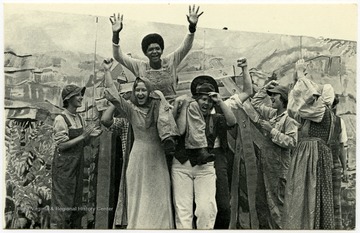
- IDNO:
- 049819
- Title:
- Postcard featuring a scene from the play "John Henry" by Maryat Lee in Summers County, W. Va.
- Date:
- ca.1975-1989
- Description:
- The caption on the postcard reads: "The moment of John Henry's victory, seconds before he dies. Performance of "John Henry" by EcoTheatre, the indigenous summer theater company of Summers County young people. Kathy Jackson in the title role.""John Henry" was a successful EcoTheater play that was performed often.Maryat Lee (born Mary Attaway Lee; May 26, 1923 – September 18, 1989) was an American playwright and theatre director who made important contributions to post-World War II avant-garde theatre. She pioneered street theatre in Harlem, and later founded EcoTheater in West Virginia, a community based theater project.Early in her career, Lee wrote and produced plays in New York City, including the street play “DOPE!” While in New York she also formed the Soul and Latin Theater (SALT), and wrote plays centered around the lives of the actors in the group.In 1970 Lee moved to West Virginia and formed the community theater group EcoTheater in 1975. Beginning with local teenagers from the Governor’s Summer Youth Program, the rural theater group grew, and produced plays based on oral histories collected from the local community. Each performance of an EcoTheater play involved audience participation and discussion. With the assistance of the Humanities Foundation of West Virginia, guest scholars became a part of EcoTheater.
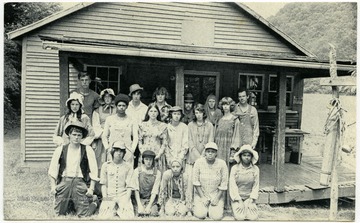
- IDNO:
- 049820
- Title:
- EcoTheater Company, Summers County, W. Va.
- Date:
- ca. 1975-1989
- Description:
- Postcard featuring members of the EcoTheater Company founded by Maryat Lee in 1975. The caption reads: "EcoTheater Company-- The indigenous summer theater of Summers County, West Virginia."Maryat Lee (born Mary Attaway Lee; May 26, 1923 – September 18, 1989) was an American playwright and theatre director who made important contributions to post-World War II avant-garde theatre. She pioneered street theatre in Harlem, and later founded EcoTheater in West Virginia, a community based theater project.Early in her career, Lee wrote and produced plays in New York City, including the street play “DOPE!” While in New York she also formed the Soul and Latin Theater (SALT), and wrote plays centered around the lives of the actors in the group.In 1970 Lee moved to West Virginia and formed the community theater group EcoTheater in 1975. Beginning with local teenagers from the Governor’s Summer Youth Program, the rural theater group grew, and produced plays based on oral histories collected from the local community. Each performance of an EcoTheater play involved audience participation and discussion. With the assistance of the Humanities Foundation of West Virginia, guest scholars became a part of EcoTheater.

- IDNO:
- 049821
- Title:
- Postcard featuring Maryat Lee's The Women's Farm, Hinton, W. Va.
- Date:
- ca. 1970-1984
- Description:
- The postcard caption reads: "A mid winter pause at The Women's Farm near Hinton. The great wings of mountains hover in frozen flight above this holler which is the home of EcoTheater and a center for the arts in southern West Virginia."Maryat Lee named her home near Hinton, W. Va. "The Women's Farm." It was her home and the home of EcoTheater until Lee moved to Lewisburg, W. Va. in 1984.Maryat Lee (born Mary Attaway Lee; May 26, 1923 – September 18, 1989) was an American playwright and theatre director who made important contributions to post-World War II avant-garde theatre. She pioneered street theatre in Harlem, and later founded EcoTheater in West Virginia, a community based theater project.Early in her career, Lee wrote and produced plays in New York City, including the street play “DOPE!” While in New York she also formed the Soul and Latin Theater (SALT), and wrote plays centered around the lives of the actors in the group.In 1970 Lee moved to West Virginia and formed the community theater group EcoTheater in 1975. Beginning with local teenagers from the Governor’s Summer Youth Program, the rural theater group grew, and produced plays based on oral histories collected from the local community. Each performance of an EcoTheater play involved audience participation and discussion. With the assistance of the Humanities Foundation of West Virginia, guest scholars became a part of EcoTheater.
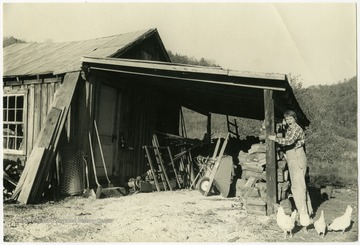
- IDNO:
- 049824
- Title:
- Maryat Lee on her farm near Hinton, W. Va.
- Date:
- ca. 1970-1989
- Description:
- Maryat Lee lived on her farm near Hinton, W. Va. in Summers County from 1970 until 1984 when she moved to Lewisburg, W. Va. She called her farm near Hinton "The Women's Farm" and it also served as the home of EcoTheater.Maryat Lee (born Mary Attaway Lee; May 26, 1923 – September 18, 1989) was an American playwright and theatre director who made important contributions to post-World War II avant-garde theatre. She pioneered street theatre in Harlem, and later founded EcoTheater in West Virginia, a community based theater project.Early in her career, Lee wrote and produced plays in New York City, including the street play “DOPE!” While in New York she also formed the Soul and Latin Theater (SALT), and wrote plays centered around the lives of the actors in the group.In 1970 Lee moved to West Virginia and formed the community theater group EcoTheater in 1975. Beginning with local teenagers from the Governor’s Summer Youth Program, the rural theater group grew, and produced plays based on oral histories collected from the local community. Each performance of an EcoTheater play involved audience participation and discussion. With the assistance of the Humanities Foundation of West Virginia, guest scholars became a part of EcoTheater.
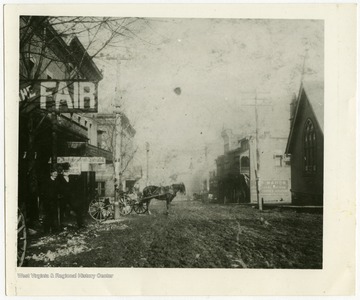
- IDNO:
- 049832
- Title:
- Episcopal Church where Big 4 is, Third Ave., Hinton, W. Va.
- Date:
- ca. 1900
- Description:
- Looking West on Temple St. Episcopal church to the right, Independent Herald Office to the left along with Fair.

- IDNO:
- 049879
- Title:
- Likely Armistice Parade, Hinton, W. Va.
- Date:
- ca. 1919
- Description:
- An old automobile decorated with American flags is pictured at the intersection of 3rd Avenue and Temple Street.

- IDNO:
- 049880
- Title:
- Army Day Parade in Downtown Hinton, W. Va.
- Date:
- 1948
- Description:
- A truck carrying uniformed soldiers is pictured at the intersection of Ballengee Street and 2nd Avenue. Subjects unidentified.
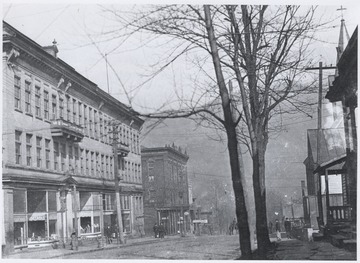
- IDNO:
- 049881
- Title:
- Scene at Second Avenue in Hinton, W. Va.
- Date:
- ca. 1920
- Description:
- View of a typical day in downtown Hinton. People are scattered across the sidewalks, conversing with associates or shopping. Subjects unidentified.

- IDNO:
- 049882
- Title:
- An Army Day Parade Float Makes Its Way through Downtown Hinton, W. Va.
- Date:
- 1948/04/06
- Description:
- Women dressed in fancy gowns stand on a float as four horses drag it along the corner of Ballengee Street and 2nd Avenue. Spectators line the sidewalks as they observe the spectacle. Subjects unidentified.
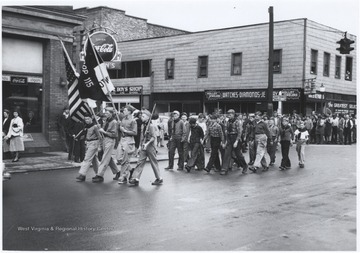
- IDNO:
- 049883
- Title:
- Boy Scout Troop 115 Marches Down the Street During the Army Day Parade, Hinton, W. Va.
- Date:
- 1948/04/06
- Description:
- Four boys in their Boy Scout uniforms lead their troop down the street. Subjects unidentified.
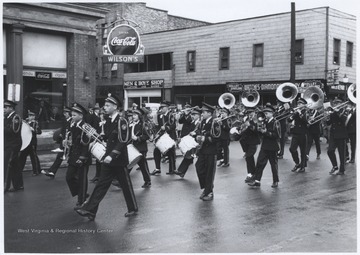
- IDNO:
- 049884
- Title:
- Marching Band Performing in the Army Day Parade, Hinton, W. Va.
- Date:
- 1948/04/06
- Description:
- Young boys in their band uniforms march down the street with their instruments in hand. Subjects unidentified.

- IDNO:
- 049885
- Title:
- Float in the Army Day Parade, Hinton, W. Va.
- Date:
- 1947
- Description:
- A young boy dressed in a football uniform sits on top of a decorated car that will participate in the Army Day Parade. Subject unidentified.











